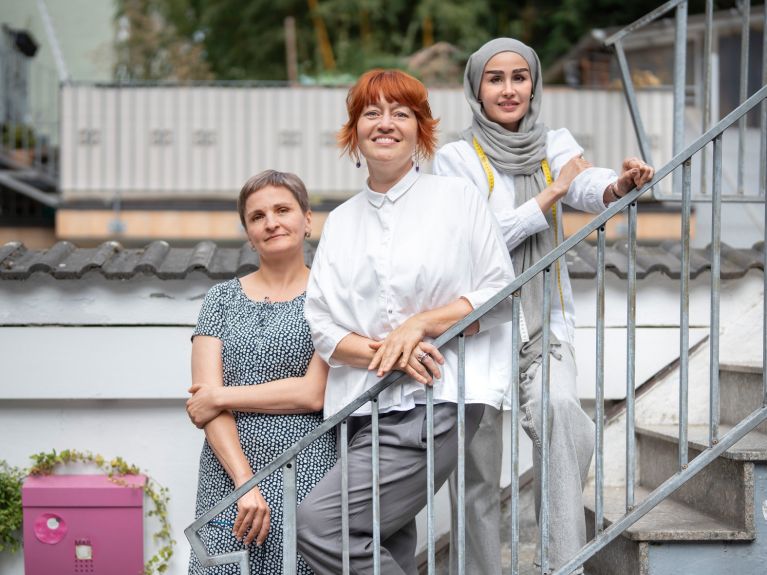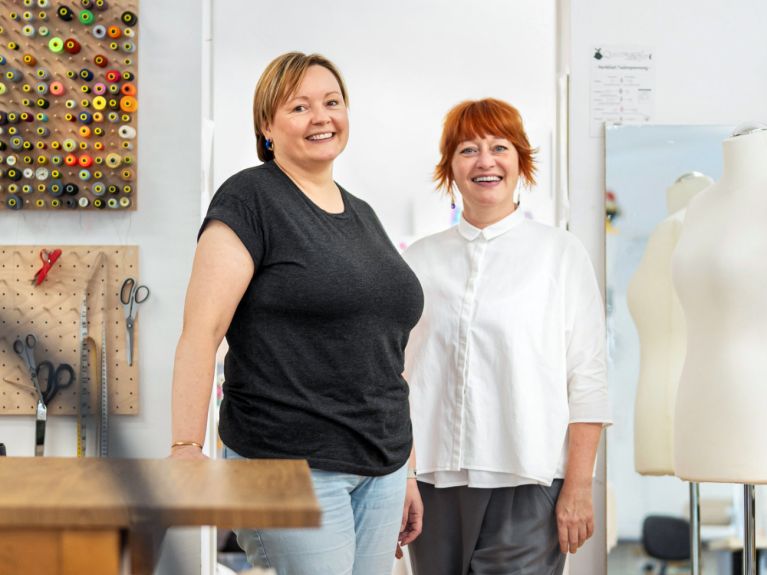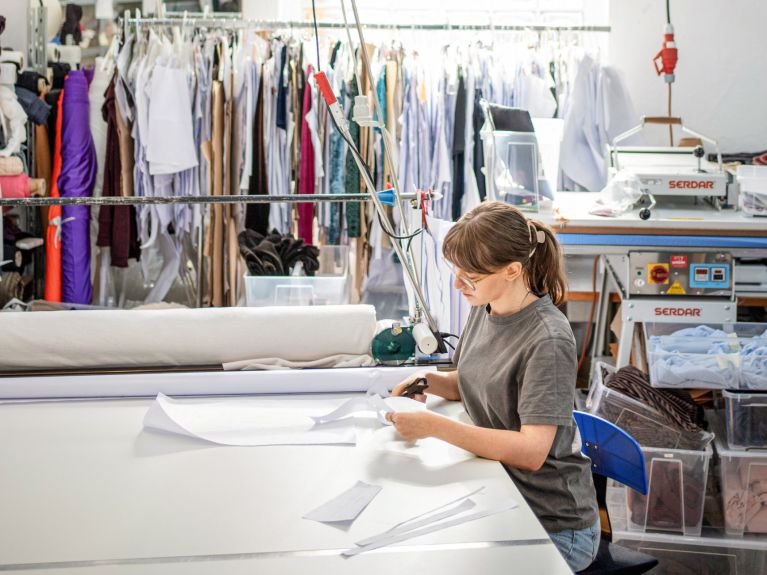Sewing: a universal language
A fashion workshop in Frankfurt am Main shows how diversity can be key to a successful business. People from many different nations work together there and enhance the business.

Shortage? What shortage? The Frankfurt-based fashion designer and bespoke dressmaker Claudia Frick found an innovative way to deal with the shortage of skilled workers. And it’s gone on to prove a successful model.
There’s an almost fairytale quality to the bright, spacious workshop of Stitch by Stitch in Frankfurt. It isn’t just down to the opulence of the rolls of fabric and threat, the patterns immaculately sorted and hung on rails, while women bend over whirring sewing machines as they craft lovely things to admire and wear. What happens here is just as improbable as the tale of a Frog Prince or Puss in Boots, as these seamstresses, who were trained in Germany, produce samples and runs of up to 500 pieces for small designers and fashion brands.
How to do this was something that Claudia Frick, Managing Director of Stitch by Stitch, had to learn for herself, too. Back in 2015 Frick, a designer and bespoke dressmaker, was looking for a workshop in Germany for her own fashion label “Coco Lores”. She wanted somewhere where skilled craftspeople could manufacture garments for her, but her search was fruitless. She did, however, find a gap in the market. “That was when I came up with the basic idea: a small-to-medium scale workshop like there used to be in the 1960s and 1970s.” Frick is referring to the factories that served regional markets and produced small runs of products, sometimes as few as ten items, sometimes 500 pieces or more. These workshops sold to end customers and retailers alike.
Access to fair work and training
In 2015, the then 52-year-old Frick saw a report on television about refugees who were skilled craftspeople. Working in collaboration with the social entrepreneur and communications designer Nicole van Alvensleben, she made up her mind to set up a tailoring and dressmaking shop. Her ambition was not only to meet the demand for skilled workers in the dressmaking industry, but also make it easier for qualified seamstresses who had experienced being refugees or migrants to access fair work and training in Germany. In other words, women who had been trained in this field in their home countries, often to very high standards. “In countries from which refugees and migrants come to Germany, tailoring and dressmaking are widespread and often at a very high level,” Frick says.
One member of her team who exemplifies this quality is Reyhane Heidari from Afghanistan, and whose family emigrated to Iran in the 1980s.
In countries from which refugees and migrants come to Germany, tailoring and dressmaking are widespread and often at a very high level.
Claudia Frick says, “I’ve never encountered anyone who contributes so much talent and ability. She is working at the level of a master craftsperson.” Reyhane Heidari already had 13 years’ experience as a seamstress in Iran, and she was in no doubt about getting qualified. In 2020, she finished top of her class, passing her dual vocational course with distinction. For her final assessment she created an asymmetrical suit with lapels in the shape of a female silhouette – to the quality of a couture fashion house. But the greatest challenge of the training process wasn’t the technical expertise, says Reyhane, a 32-year-old mother of one. Rather, it was the language barrier. “I had no problem with the practical tasks. I knew I could do it. I had to study a lot for the theoretical parts.”

Practising German at every opportunity
It was a big step, as at first she could barely even utter a friendly “hello”, she says. Despite this, Reyhane and Claudia Frick understood each other. “How you sew a blouse in Afghanistan or Venezuela is exactly the same as how you do it in Germany. Darts, grain, inlay: the craft of dressmaking is a universal language.” That principle is the bedrock on which Stitch by Stitch is built, such as in the after-hours German lessons which Rainer Vollmar, a lecturer, provides free of charge once a week. The workforce includes women from Afghanistan, Ethiopia, Syria, Venezuela and Ukraine, and Claudia Frick and Nadja Losse (a cultural anthropologist who has served as managing director since the departure of Nicole van Alvensleben) encourage the staff to try out and improve their German skills at work. “We focus on situations in everyday life, such as ordering food over the phone. They try to avoid that, as it can be stressful,” Frick says. Dressmaking vocabulary is written on a blackboard in the workshop.
I love my new career, particularly because there’s always something new. It never gets dull. There is always a new material, a new process.
The wraparound approach to language learning has achieved impressive results, such as for Tetiana Korenivska from Ukraine. She trained to be a pattern maker and technician there and went on to work in the industry. Claudia Frick says Tetiana’s expertise is a huge asset. “We were so lucky to be able to recruit her,” she adds. Tetiana, 45 and a mother of three, has been in Germany since 2023, when she joined the 18-strong team at Stitch by Stitch. “I love my new career, particularly because there’s always something new. It never gets dull. There is always a new material, a new process.
Sometimes I have to stop and think for a bit about how it could work. It might look as if I’m not doing anything, but I am working!” she laughs. In partnership with Claudia Frick, she develops new product ideas to extend the workshop’s range of products and boost its order book.
Award-winning entrepreneurs
Stitch by Stitch operates as a not-for-profit sustainable social business, funded by the City of Frankfurt am Main on behalf of the Frankfurter Arbeitsmarktprogramm, amongst others. Among the awards the businesses has achieved is the 2017 Hesse Award for. It has achieved this recognition for offering women from migrant and refugee backgrounds prospects for the future with fair work and training places. Nadja Losse says, “In conjunction with the opera house workshops, we have become one of the largest providers of training in tailoring and dressmaking in Frankfurt and the Rhine-Main region.”

But the workshop also meets a commercial need in the quality of its craftsmanship – which must always prove its worth on the open market, be that in commissions for businesses and organisations, when working on upcycling and recycling, or in its own products under the “Stitch” label. That is not easy in an industry infamous for wage dumping and is therefore concentrated in low-wage countries. Despite all this, Claudia Frick and Nadja Losse stress that their workshop enjoys many exceptional benefits, from the outstanding training to the high quality of their products and the cultural diversity the women bring with them.
Putting “Made in Germany” centre stage
A further benefit consists of the technical expertise that the workshop possess across the many different machines operated there. Nowhere is this more evident than when it comes to jersey – a notoriously difficult material to work with. “No problem!” says Reyhane Heidari, who specialises in handling complicated materials and tricky technology. She recently found a solution to a problem with a special type of sewing machine: she’s a real expert, just one of the many women on the team who puts “Made in Germany” centre stage every day.


